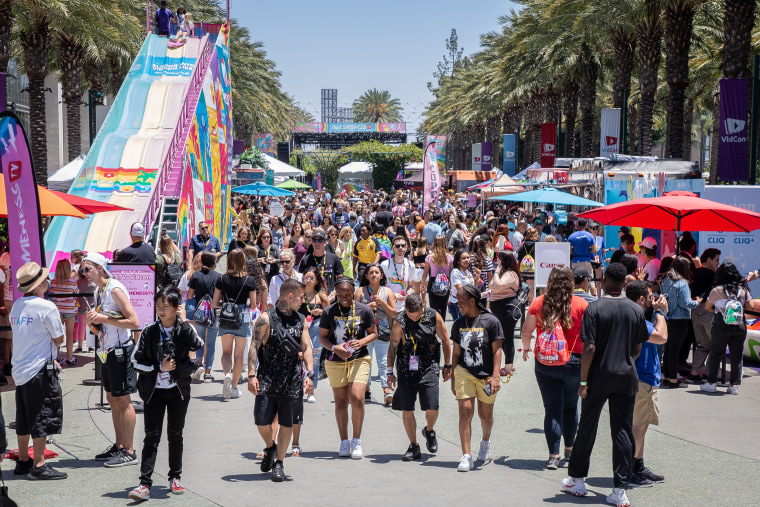ANAHEIM, Calif. — Long lines of antsy teens and parents, many wearing purple badges stamped with the word “creator,” snaked around the Anaheim Convention Center’s top floor on Thursday as a part of VidCon, the yearly event dedicated to online video creators with a heavy emphasis on YouTube.
Inside various ballrooms, YouTube stars were holding talks on how to grow digital channels, while outside the atmosphere was reminiscent of a festival scene with towering, multi-colored candy dispensers, a giant rainbow slide and rows of food trucks leading to a stage where booming music played.
Despite YouTube’s recent challenges with child predators and hate speech, the video platform remains a massive draw for young people who hope to gain a bit of digital stardom. And at VidCon, the year’s biggest event for YouTube creators, the company’s troubles were almost non-existent.
“I’m on YouTube a lot but I have not heard anything like that,” said Kathy Dempsey, who was attending the event with her niece, when asked about some of YouTube’s recent troubles.
Safety on YouTube is something she discusses frequently with her niece, adding that they recently had a conversation about suggestive comments and being extra cautious with people online she doesn’t know.
“We just talked about when there’s people who they don’t know or who even make suggestive comments or are friendlier than usual, just to be cautious,” Dempsey said. “It’s better to have an abundance of caution.”
Of the more than 20 parents, YouTubers, and YouTube viewers interviewed by NBC News at VidCon, only four said they were aware of the controversies from earlier this year. The four who were aware said the news hadn’t deterred them from using the platform. Several people chaperoning teens and children said they fear adults catfishing younger users on the site more than anything else.
Earlier this year, YouTube came under fire after a video showed how predatory comments were helping to guide other predators to videos of young children in potentially compromising situations. Some of the videos showed young girls in bathing suits or doing gymnastics with insidious comments posted below. The video also documented how YouTube’s algorithm was pushing videos of minors to people who had already viewed one of these videos.
The backlash to the video revealing these issues was resonated with advertisers like AT&T, Nestlé and Epic Games, which paused their advertising with YouTube while the situation was investigated.
YouTube later said in a blog post it would disable comments on videos featuring minors, change the recommendations feature to scuttle content that was considered “borderline,” and restrict the livestreaming feature to its younger users.
“YouTube is a company made up of parents and families, and we’ll always do everything we can to prevent any use of our platform that attempts to exploit or endanger minors,” YouTube said in the blog post. “Kids and families deserve the best protection we have to offer: We’re committed to investing in the teams and technology to make sure they get it.”
But at VidCon, YouTube has kept intact its image as the friendly, red play button, though many were cognizant of the broader risks young people face on the internet.
On the other side of the convention center, at a networking meetup for teens, Xandra Overwick, 15, a YouTuber who uploads videos of herself playing the video game Minecraft, and her grandmother Tina Mrazek, of Minnesota, said they were unaware of the issue the platform faced earlier this year but said they often have conversations about safety online.
“You hear the stories about predators and people who pretend to be someone they’re not, but she kind of helps with my fears a little because she video chats with people so she knows these people she’s talking to are people her age and not 40-year-old men or 50-year-old men,” Mrazek said.
Although many at VidCon said they had general concerns about children and the internet, one couple said they had followed the issues with predatory comments that sprung up earlier this year.
Meghan Graham, 29, and Dustin Buck, 31, who run a video game-focused channel on YouTube called “Neon + Nova,” said Thursday was their third time at VidCon. The pair said they’ve followed the issues with children on the platform and said they’re hoping to be a part of the positive content on the site that eventually drowns out the negative content.
“I watch a few family channels and I noticed when comments started being disabled and things like that,” Graham said.
Buck added, “It’s one of those things where you know those things are happening so you want to kind of go against those things, and create more positive communities and focus on that and hopefully, in the end, more positive communities like the ones we’re trying to build can out-do some of that negativity."
Waiting outside a ballroom on the top floor of the convention center, Hailey Sasnett, 14, and her father Thomas Sasnett, of Arizona, said they watch YouTube but don’t have their own channels.
Thomas Sasnett said he thinks it’s up to parents to monitor their children’s channels and called the comment section on YouTube a “cesspool,” though he did not necessarily feel the company needed to take action.
“I’m not in favor of turning off comments or things like that. I mean I get it for protection of children, but I’m not in favor of that in general,” Sasnett said.
Sasnett added that he has concerns about YouTube’s algorithm because no one outside of YouTube knows how it works or why it picks certain videos to promote. He said he has some concerns about his son, who is 5, eventually using YouTube, and said that he feels the platform is “impossible to moderate.”
“It’s impossible to moderate 100 percent,” Sasnett said. “Human moderators are good but even then that’s tough to do because the people who are seeing that work and doing that stuff, it’s hurtful to them as well. Moderation is tough.”

